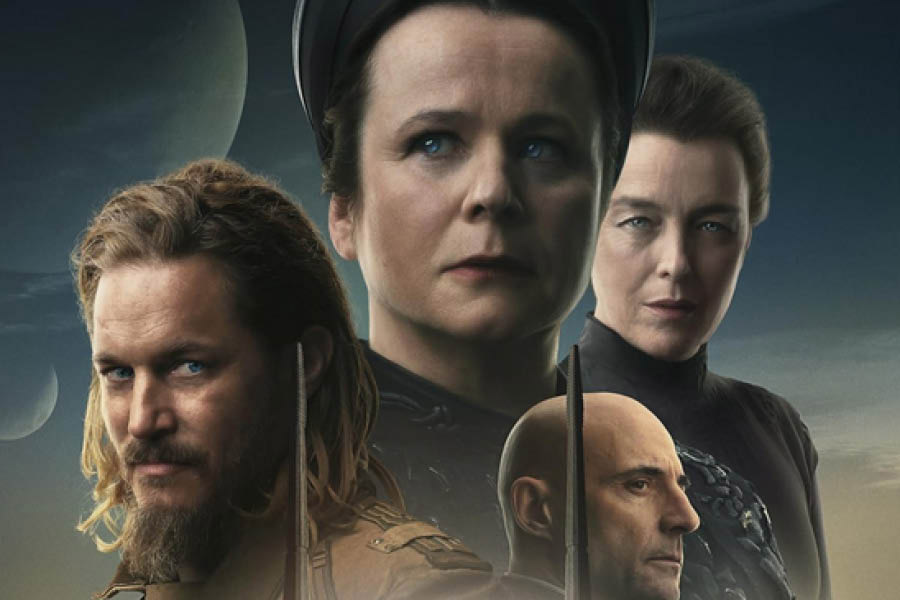There was a time when fans of Frank Herbert’s Dune was limited to those who read the original tome. Thanks to Denis Villeneuve’s outstanding adaptations of what was once considered unfilmable, there are, of course, many Dune fans now and HBO’s latest prestige television series Dune: Prophecy, based on the extended Dune universe, is meant to cash in on that extended fanbase.
As it is with any franchise, the first episode of Dune: Prophecy, developed by Diane Ademu-John and Alison Schapker, titled The Hidden Hand is full of exposition and setting up of premises, people and places, which leaves very little room for too much of anything else. The show starts with the Butlerian Jihad that marked the end of humanity’s war against the ‘thinking machines’ where the battle lines were drawn with the House Atreides emerging heroes and House Harkonnen branded cowards (ooh, the mentioned known names!).
We then hurtle forward some years to a young Valya Harkonnen (Jessica Barden), who sets out to change history that made Atreidis heroes and Harkonnens cowards. She joins the ‘Sisterhood’, which is what the Bene Gesserit were called, that develops powers in women to make them Truthsayers who are then sent to various Great Houses from where they lay out a network of control. But the main aim of the Mother Superior was to put an acolyte of the Sisterhood on the throne, something which required careful mingling of royal bloodlines as dictated by the Sisterhood. Valya is a believer in this cause and when the Mother Superior dies after sharing a violent vision of sand worms, burning flesh and blood, she uses ‘the Voice’ (yay, something else that’s familiar) that she seems to have come up with to violently silence the faction that feels otherwise.
We then hurtle forward another 30 years — placing us around 100 years after the machine wars and 10,000 years before Timothee Chalamet’s Paul Atreides (because of course there has to be a connection) — to the present where Valya (Emily Watson) is the Mother Superior and, along with her sister (twice!) Tula Harkonnen (Olivia Williams), she is training a new generation of acolytes to be Truthsayers. There is a wedding being orchestrated between House Corrino that rules the Imperium and House Richese by the Sisterhood to make sure that the Emperor Javicco’s (Mark Strong) daughter Ynez (Sarah-Sofie Boussnina), who is going to train as an acolyte, will produce an heir who the Sisterhood can completely control.
Into this mix comes a stranger called Desmond Hart (Travis Fimmel), a veteran soldier who survived an attack on Arrakis (yes, they mention the planet and spice) and comes to warn the Emperor of insurgency by other Houses. But there is more to this man than meets the eye, because he can seemingly burn nine-year-old boys (this is prestige television from HBO, of course there will be children dying violent deaths and gratuitous nudity) with a look and one of the Sisters lightyears away.
The world of Dune: Prophecy looks similar to the world we see in the Dune movies but doesn’t feel as grand. That’s where all similarity ends. None of the actors, especially those of the calibre of Watson and Strong, get much to play with. While the first is busy providing narrative voiceover or explaining her actions to her sister, who explains things back to her, the second seems to be always confused. Ynez is cool but somehow she doesn’t feel important to the narrative despite being at the centre of it. Actually the only intriguing part of the whole 66-minute episode is Fimmel’s Hart, his mysterious power and his role in thwarting the Sisterhood.
We hope that with all the exposition and scene-setting out of the way, the show will be able to open up and explore each character and their motivations with more depth over the next five episodes, but it feels like it has bitten off more than it can chew. And given the way HBO’s other prestige television series, The Rings of Power, has panned out, we’ll be keeping our expectations low.










